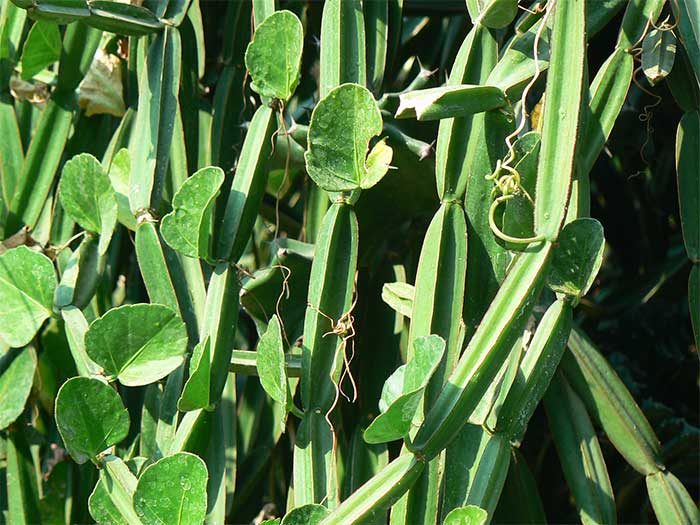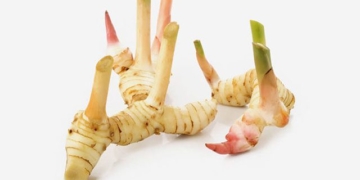The four-cornered vine (Cissus quadrangularis), also known as the four-cornered key vine, is believed to have therapeutic properties for conditions such as arthritis, obesity, and reducing blood lipids. But how true is this?
Benefits of the Four-Cornered Vine
The four-cornered vine (Cissus quadrangularis) has been used as a medicinal plant for centuries. This plant primarily grows in tropical climates and is a member of the grape family (Vitaceae). While many parts of the four-cornered vine contain various nutrients, the stem is particularly noted for its health benefits.
Bioactive compounds found in the four-cornered vine include flavonoids, phenols, tannins, phytosterols (including beta-sitosterol), and resveratrol. Additionally, this vine is a source of calcium, phosphorus, vitamin A, vitamin C, and other nutrients.
Below are details regarding the health benefits of the four-cornered vine, along with potential benefits, side effects, and usage based on scientific research.
1. Health benefits of the four-cornered vine
Today, extracts from the leaves, roots, and stems of the four-cornered vine are widely available as herbal supplements in powder, capsule, or syrup form. Although there is considerable information regarding the effects of the four-cornered vine in treating various health conditions, such as gout and asthma, only a few have been substantiated by scientific studies. Specifically:
1.1. The four-cornered vine aids in recovery from fractures
Studies on both animals and humans have found that the four-cornered vine can help reduce bone loss, speed up the healing of fractures, and prevent osteoporosis.

Image of the four-cornered vine. (Photo: ST).
According to Healthline, a study involving 9 participants who took 500mg of four-cornered vine extract three times daily for 6 weeks showed improved healing rates for fractures, including pain relief and reduced swelling.
Another 3-month study involving 60 participants indicated that a daily dose of 1,200mg of the four-cornered vine promoted fracture healing and increased the levels of specific proteins necessary for new bone formation.
1.2. Prevention of osteoporosis
A 2023 study published in MDPI demonstrated that the four-cornered vine inhibits the activity of osteoclasts (cells responsible for bone resorption).
The risk of osteoporosis increases in postmenopausal women, leading some researchers to propose the four-cornered vine as a potential preventive measure. Specifically, over 100 postmenopausal women with osteoporosis or at risk of osteoporosis took either a placebo or the four-cornered vine daily for 24 weeks. Results showed that both groups experienced slowed bone loss; however, bone mineral density did not significantly improve in either group.
Other human trials have also indicated that the four-cornered vine may contribute to the treatment of osteoporosis, but further research with larger and more diverse populations is required before drawing definitive conclusions.
1.3. Arthritis, pain relief, and swelling
According to Healthline, the four-cornered vine has been shown to help reduce joint pain and symptoms of arthritis, including rheumatoid arthritis, characterized by swollen, painful joints and stiffness due to its bioactive compounds like flavonoids, triterpenoids, and steroid-like substances (though the four-cornered vine is not a steroid), which have anti-inflammatory, analgesic, and antioxidant effects.
A 2013 study published on NCBI involving 29 men with chronic joint pain who took 3,200mg of the four-cornered vine daily for 8 weeks found significant reductions in exercise-induced joint pain.
VeryWell Health reported that an animal study indicated the four-cornered vine may help lower levels of a biomarker associated with inflammation, elevated in people with arthritis, known as tumor necrosis factor-alpha (TNF-alpha).
However, these studies are still limited, and we cannot yet conclusively state that the four-cornered vine cures arthritis or joint pain. Thus, the question of whether the four-cornered vine can treat arthritis remains unproven.
1.5. May help prevent metabolic syndrome
Metabolic syndrome is a cluster of conditions that can increase the risk of heart disease, stroke, and diabetes. These issues include excess abdominal fat, high blood pressure, elevated blood sugar, and increased cholesterol or triglycerides.

The four-cornered vine has many potential health benefits. (Photo: ST).
According to Healthline, in an 8-week study involving 123 participants who consumed 1,028mg of the four-cornered vine daily along with supplements including green tea, selenium, and chromium, participants showed significant changes in weight and abdominal fat, improved fasting blood sugar levels, reduced triglycerides, and lower total and bad cholesterol levels.
However, a meta-analysis of 9 studies on the effects of the four-cornered vine on metabolic syndrome showed that this plant only promotes effective weight loss when used alongside other supplements, not when taken alone.
Due to the lack of large studies, the effects of the four-cornered vine on metabolic syndrome, particularly in prevention or treatment, remain unverified.
2. Potential risks of the four-cornered vine
Numerous studies indicate that the four-cornered vine is relatively safe to use, with very few reports of potential side effects. However, a small number of individuals have experienced side effects, including:
Bloating
- Diarrhea
- Dry mouth
- Headaches
- Insomnia
Among these, headaches and bloating are the most commonly reported side effects, especially when taken at higher doses.
So, can pregnant women use the four-cornered vine? Both pregnant and breastfeeding women should avoid the four-cornered vine until further information confirms its safety for these groups.
Regarding drug interactions, there is no solid evidence of interactions between the four-cornered vine and medications, but potential interactions may exist. For example, due to the potential hypoglycemic effects of the four-cornered vine, it may interact with other diabetes medications or hypoglycemic agents, potentially leading to dangerously low blood sugar levels.
However, surprisingly, this risk has not been formally reported. Therefore, it is crucial to consult with a doctor before using any supplements, especially when treating chronic conditions.

Use the four-cornered vine only under a doctor’s guidance. (Photo: ST).
3. Recommended dosage of the four-cornered vine
According to Healthline, there are no official recommended dosages for the four-cornered vine. Most supplements derived from this vine are available in powder, capsule, or syrup form sold widely in stores and pharmacies, with recommended doses ranging from 500 to 1,000mg per day.
Research on NCBI in 2021 suggested doses of 300mg to 3,200mg per day could be beneficial. Nonetheless, it is advisable to start with a lower dose and gradually increase it to assess your condition and consult a doctor before use.
4. Frequently Asked Questions
Does the four-cornered vine help with weight loss?
According to VeryWell Health, some small studies have found a potential link between the four-cornered vine and weight loss. In one study, participants classified as obese consumed either a placebo or 300mg of the stem and leaf extract of the four-cornered vine daily for 8 weeks.
Compared to the placebo group, this group showed a more significant change in weight. However, there is not enough data to conclude that the use of four-winged vine (Hồ đằng bốn cánh) is effective for weight loss, nor is there a clear indication of the necessary dosage to achieve this goal. It is important to remember that no supplement can help you achieve long-term and healthy weight loss.
Does Four-Winged Vine Enhance Libido?
There is no evidence or research supporting that extracts from four-winged vine can enhance testosterone levels in men.
The above information pertains to the effects of four-winged vine, also known as the four-cornered vine (cây chìa vôi bốn cạnh). This information is for reference only; patients should not self-medicate or use it without consulting a healthcare professional or specialist.



















































